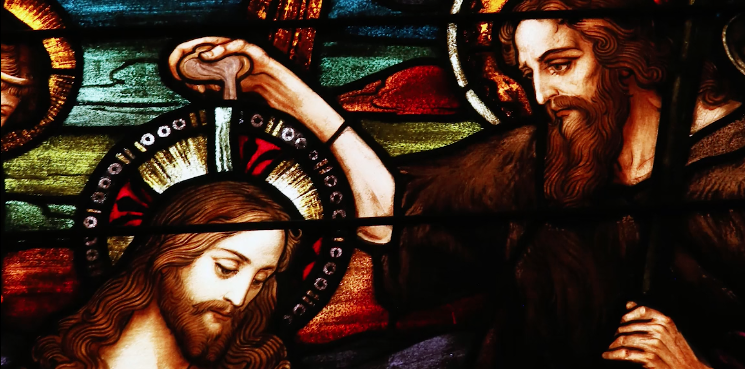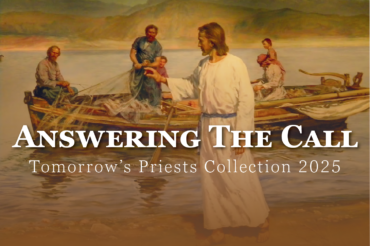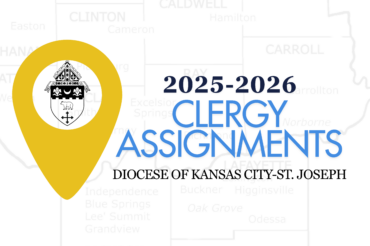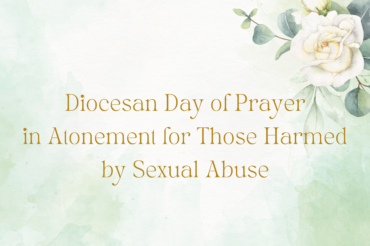The Baptism Of Jesus

God’s Word in Everyday Living
Deacon Scott McKellar
The season of Advent is a time of preparation to make our hearts ready for an encounter with the flesh and blood humanity of Jesus. We call this the Incarnation. John offered his fellow Jews a baptism of repentance for the forgiveness of sins, yet John the Baptist’s call to repentance and baptism was a prophetic act pointing forward to the coming of Christ (Acts 19:4).
Today as we close the Christmas season, we celebrate the Baptism of Jesus. Given the nature of John’s baptism, it is very puzzling that Jesus allowed John to baptize him. Very rightly, “John tried to prevent him” from doing so (Matthew 3:14). Since Jesus was without sin, why would Jesus submit to John’s baptism of repentance for the forgiveness of sins?
We find the answer in our first reading from the Prophet Isaiah, which speaks about the future coming of the Messiah. Jesus interpreted his mission as a fulfillment of the Suffering Servant figure in Isaiah (Luke 4:18-21, 7:18-22).
We can divide the book of Isaiah into two parts: the Book of Woes (Isaiah 1–39), which deals with Israel’s exile, and the Book of Consolations (Isaiah 40–66), which concerns God’s future promises for a restored Israel. In the Book of Consolations, a mysterious figure appears called the Suffering Servant.
Our Old Testament reading for this Mass begins with this second part of Isaiah: “Here is my servant whom I uphold, my chosen one with whom I am pleased. Upon him I have put my spirit; he shall bring forth justice to the nations” (Isaiah 42:1). The Catechism notes, “The baptism of Jesus is on his part the acceptance and inauguration of his mission as God’s suffering Servant. He allows himself to be numbered among sinners” (CCC 536).
It is through baptism that we enter into communion with Christ (1 Corinthians 12:13, Galatians 3:27). Christ joins us to himself in order that we might experience the fruits of his suffering on the cross. Jesus takes the sins of humanity upon himself on the cross, and out of love, shares his forgiveness with us through baptism.
By allowing himself to be baptized, Jesus sanctifies the waters of Baptism and opens the heavens to sinners (Matthew 3:16). The waters of Baptism represented death and rising to new life. St. Paul notes, “Therefore we have been buried with him by baptism into death, so that, just as Christ was raised from the dead by the glory of the Father, so we too might walk in newness of life” (Romans 6:4).
Jesus joined himself to sinful humanity in order that, out of love, he might bring them new life in the Spirit through his sacrificial death on the cross.
John the Baptist told the crowds “I am baptizing you with water, but . . . He will baptize you with the Holy Spirit and fire” (Luke 3:16). Regarding the Suffering Servant, Isaiah tells us, “The spirit of the Lord GOD is upon me, because the LORD has anointed me; he has sent me to bring good news. . .” (Isaiah 61:1). The ministry of the Lord’s Suffering Servant is both confirmed and empowered the Holy Spirit.
Matthew tells us “the heavens were opened” and “the Spirit of God descending like a dove” upon Jesus (Matthew 3:16).
Jesus mission is also confirmed when a “voice came from the heavens,” saying, “This is my beloved Son, with whom I am well pleased” (Matthew 3:17). These words seem in part to echo Psalm 2:7 “You are my son; today I have begotten you” but also today’s reading from Isaiah 42:1 “my servant . . . with whom I am pleased.”
If John’s Baptism was pointing forward to something new, what does Jesus Baptism mean to each of us today? In ancient Judaism, the covenant of circumcision allowed each Jewish person to begin their life as part of God’s family. One did not need to earn their way into the covenant, it was a gracious gift, which you could accept or reject.
St. Paul notes that in a certain sense Christian baptism is like a spiritual covenant of circumcision or a “circumcision of Christ” (Colossians 2:11). St. Paul notes that we are joined to Christ in baptism, “You were buried with him in baptism, in which you were also raised with him through faith in the power of God” (Colossians 2:12). Yet for those baptized as infants, a personal act of faith is necessary to ratify this covenant.
In his Pentecost sermon, the Apostle Peter replies to the crowds, “Repent and be baptized, every one of you, in the name of Jesus Christ for the forgiveness of your sins; and you will receive the gift of the Holy Spirit.” (Acts 2:38).
St. Peter notes that the normal journey to fullness of life in Christ involves a number of key elements: faith, repentance, Baptism, and reception of the Spirit. While not suggesting we can do anything to merit our salvation, the graces of baptism require an individual response of faith and repentance as well as the reception of the Spirit.
The faith of our parents and Godparents brought us to Baptism as an infant, but this is only the beginning of our faith journey. As the fathers of Second Vatican Council noted we also require a personal response called “the obedience of faith” (Romans 13:26; 2 Corinthians 10:5-6).
The council fathers tell us this type of faith is “an obedience by which man commits his whole self freely to God, offering the full submission of intellect and will to God who reveals,” (Dei Verbum 5). This act of faith leads us to a life in the Spirit. “The grace of God and the interior help of the Holy Spirit must precede and assist, moving the heart and turning it to God, opening the eyes of the mind and giving ‘joy and ease to everyone in assenting to the truth and believing it’” (Dei Verbum 5).
As Jesus modeled for us at his baptism, this spirit-lead and faith-filled movement of the soul is also intended to result in an interior relationship with the Spirit who cries out “Abba Father” in our hearts (Romans 8:14-15, Galatians 4:6). Confirmation allows us to receive the fullness of the Spirit, but faith and our full cooperation is necessary to experience the intended fruits of this sacrament.
Imagine what would happen in our families and parishes if each one of us concluded this Christmas season with a resolution to renew our docility to God in prayer and in fullness of faith to unwrap his most precious gifts to us. Yes, Lord I give you my heart!
Deacon Scott McKellar is pastoral associate at St. Therese Parish, North.
For this Sunday’s scripture readings and readings throughout the year, visit the USCCB website.





